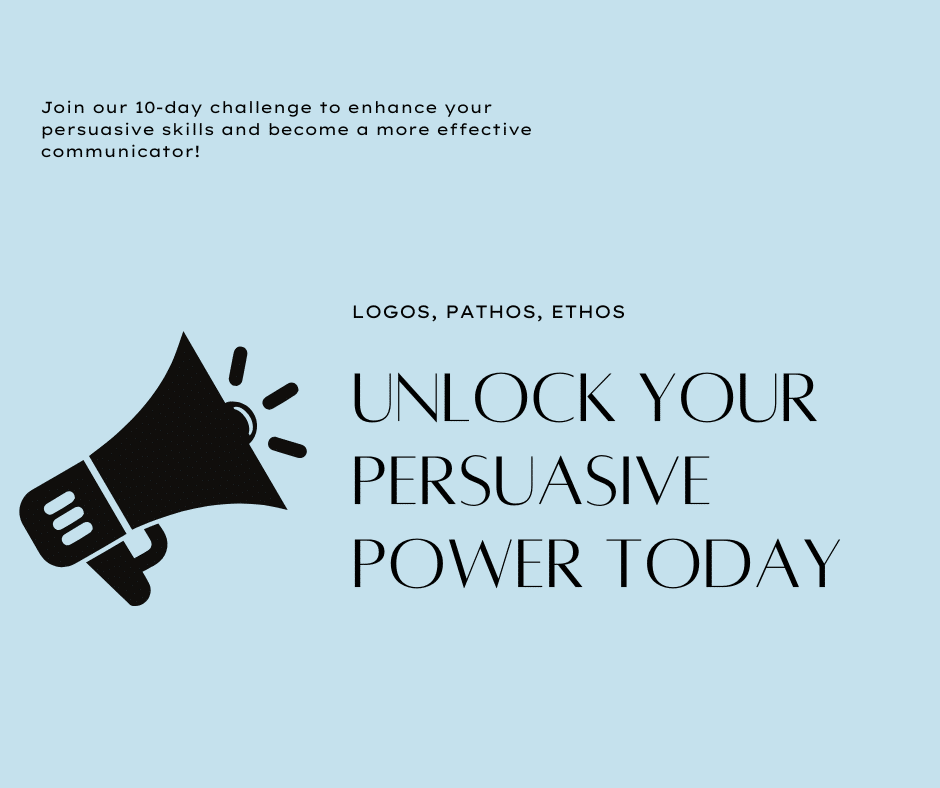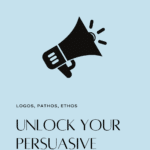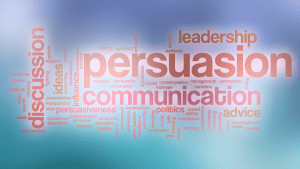In today’s world, effective communication is crucial whether you’re leading a team, presenting an idea, or inspiring an audience. To truly persuade, you need more than just facts or charisma. Enter Aristotle’s timeless trio: logos, pathos, and ethos. These three persuasive appeals—logic, emotion, and credibility—are essential to connect with and inspire your audience. If you want to build a powerful, well-rounded communication style, the 10-Day Logos, Pathos, and Ethos Challenge is for you.
What Are Logos, Pathos, and Ethos?
- Logos appeals to logic and reason, focusing on factual evidence.
- Pathos taps into the audience’s emotions, crafting an emotional connection.
- Ethos establishes the speaker’s credibility and trustworthiness.
This challenge focuses on mastering each appeal individually and integrating them effectively by the end. Ready to take your communication to the next level? Let’s dive in!

The 10-Day Challenge
Each day is dedicated to a specific skill. By focusing on one area per day, you’ll gain a deep understanding of how to use logos, pathos, and ethos in your interactions.
Days 1-3: Mastering Logos (Logic)
Logos relies on logic and data to convince your audience. These days will focus on structuring arguments and supporting them with evidence.
- Day 1: Define Your Goals with Logic
Identify a current project or challenge. Write down clear objectives and logical reasons why these goals are important, using data and facts to support your rationale. - Day 2: Build an Evidence-Based Argument
Choose a topic to persuade someone about. Gather research and factual evidence to create a strong, logical argument. - Day 3: Practice Logical Sequencing
Structure a recent discussion or presentation logically, ensuring a clear, rational flow. Test it with someone to see if they follow your reasoning.
Days 4-6: Building Pathos (Emotion)
Pathos connects with the audience emotionally, sparking empathy, inspiration, or passion.
- Day 4: Identify Your Audience’s Emotions
Consider what your audience values and what resonates with them. Write a message that appeals to these emotions and values. - Day 5: Craft a Story for Impact
Storytelling is one of the most effective ways to build an emotional connection. Create a story that supports your message, evoking empathy, urgency, or joy. - Day 6: Test Your Storytelling Skills
Share your story with someone, focusing on how you deliver it (tone, pauses, emphasis). Gather feedback on how it made them feel.
Days 7-9: Establishing Ethos (Credibility)
Ethos is all about building trust and establishing yourself as credible and knowledgeable.
- Day 7: Identify and Communicate Your Expertise
Highlight your relevant strengths and experiences. Practice a brief introduction that subtly emphasizes your credibility. - Day 8: Build Trust Through Consistency
Make a small commitment to someone and follow through. Reflect on how consistency builds trustworthiness over time. - Day 9: Practice Humble Confidence
Write a brief speech or email where you show expertise but also admit a growth area. Authenticity is a key part of building ethos.
Day 10: Integrating Logos, Pathos, and Ethos
Now that you’ve built each skill individually, it’s time to bring them together. Choose a topic or proposal, then build a persuasive argument using all three appeals:
- Logos: Present data or logical arguments.
- Pathos: Integrate an emotional story or appeal to values.
- Ethos: Highlight your expertise and credibility on the subject.
Deliver this argument to an audience or peer and observe how they respond. This will help you see the combined impact of logic, emotion, and credibility in action.
Recommended Reading
Check out Gravitas: Communicate with Confidence, Influence, and Authority by Caroline Goyder, a renowned voice coach. Her insights guide readers to enhance confidence and influence in communication.
Conclusion
The 10-Day Logos, Pathos, and Ethos Challenge is a journey to more effective communication. By developing each persuasive appeal separately, you can see the unique impact of logos, pathos, and ethos and understand how to balance them for maximum effect.
Whether you’re a leader, a manager, or simply someone who wants to improve their influence, this challenge is a powerful tool for growth. Take the time, day by day, to enhance your skills, and you’ll see the difference in how people respond to your ideas, proposals, and leadership.
Ready to take on the challenge? Start today, track your progress, and let us know how it’s transforming your communication skills in the comments below!












